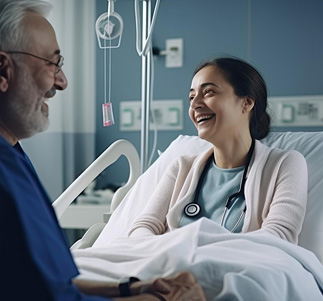IVF is a highly effective and widely utilized assisted reproductive technology (ART) designed to help couples overcome the challenges of infertility. IVF involves several key steps:
1. Initial Consultation and Fertility Assessment
At Centrum Clinic IVF journey begins with a consultation with Prof. Dr. Pabuccu. During this initial meeting, doctor will review your medical history, comprehensive fertility tests will be conducted, and your reproductive goals will be discussed in detail. This allows us to develop a personalized treatment plan tailored precisely to your needs and circumstances.
2. Ovarian Stimulation
Once your personalized treatment plan is established, on 2nd or 3rd day of your menstrual cycle fertility medications are administered to stimulate the production of multiple eggs (follicles). This process takes between 10 to 14 days, depending on ovarian response. When the ovarian follicles reach the optimal size, ovulation is triggered, and egg collection is scheduled for 34 to 36 hours later.
3. Egg Collection
The eggs are retrieved from the ovaries through a minor surgical procedure performed under mild sedation, typically lasting 15 to 20 minutes. After retrieval, the eggs are immediately transferred to the laboratory for fertilization. The male partner will provide a sperm sample naturally, or if needed, sperm will be collected surgically.
4. Fertilization
In the laboratory, the mature eggs are combined with sperm using the most appropriate technique, as determined during your treatment planning. At Centrum Clinic, we use cutting-edge techniques such ICSI, IMSI, Piezo-ICSI, Oocyce Electoactivation and special sperm selection methods to maximize the chances of fertilization and pregnancy.
5. Embryo Development
The fertilized eggs, now referred to as embryos, are cultured in the laboratory for several days. During this critical period, their growth and development are closely monitored by our expert embryologists. This careful observation ensures that only the highest quality embryos are selected for transfer.
6. Embryo Transfer
Embryo transfer can be performed using either fresh or frozen embryos. A fresh embryo transfer occurs 3-5 days after fertilization, with the highest quality embryo(s) being selected and transferred directly into the woman’s uterus within the same cycle. In a Frozen Embryo Transfer (FET), previously frozen and stored embryos are thawed and then transferred into the uterus. Both fresh and frozen embryo transfers have been shown to be effective, and the choice between them will depend on factors such as the patient’s health, the quality/number of the embryos, and specific treatment goals. Doctor Pabuccu will guide you in choosing the best approach for your individual situation.
Furthermore, Prof. Dr. Pabuccu has made significant contributions to the field with his research on ‘Low Dose hCG Support in Modified Natural Frozen Embryo Transfer Cycles,’ further enriching the literature on this important aspect of fertility treatment.
7. Pregnancy Test
12 days after the embryo transfer, a blood test is performed to determine whether the embryo has successfully implanted and resulted in a pregnancy. This critical step confirms the outcome of the IVF cycle. During this waiting period, it is essential to follow the doctor’s instructions, which will be thoroughly explained by our nurses and patient coordinators.
At Centrum Clinic, we understand that the journey to parenthood can be complex and challenging, and we are here to support you every step of the way. With our experienced team of fertility specialists and state-of-the-art laboratory, we are dedicated to guiding you through every step of your journey with the utmost care and professionalism.
If you are considering IVF treatment, we encourage you to book a consultation with Prof. Dr. Pabuccu to thoroughly discuss your fertility prospects and explore your options in detail.



